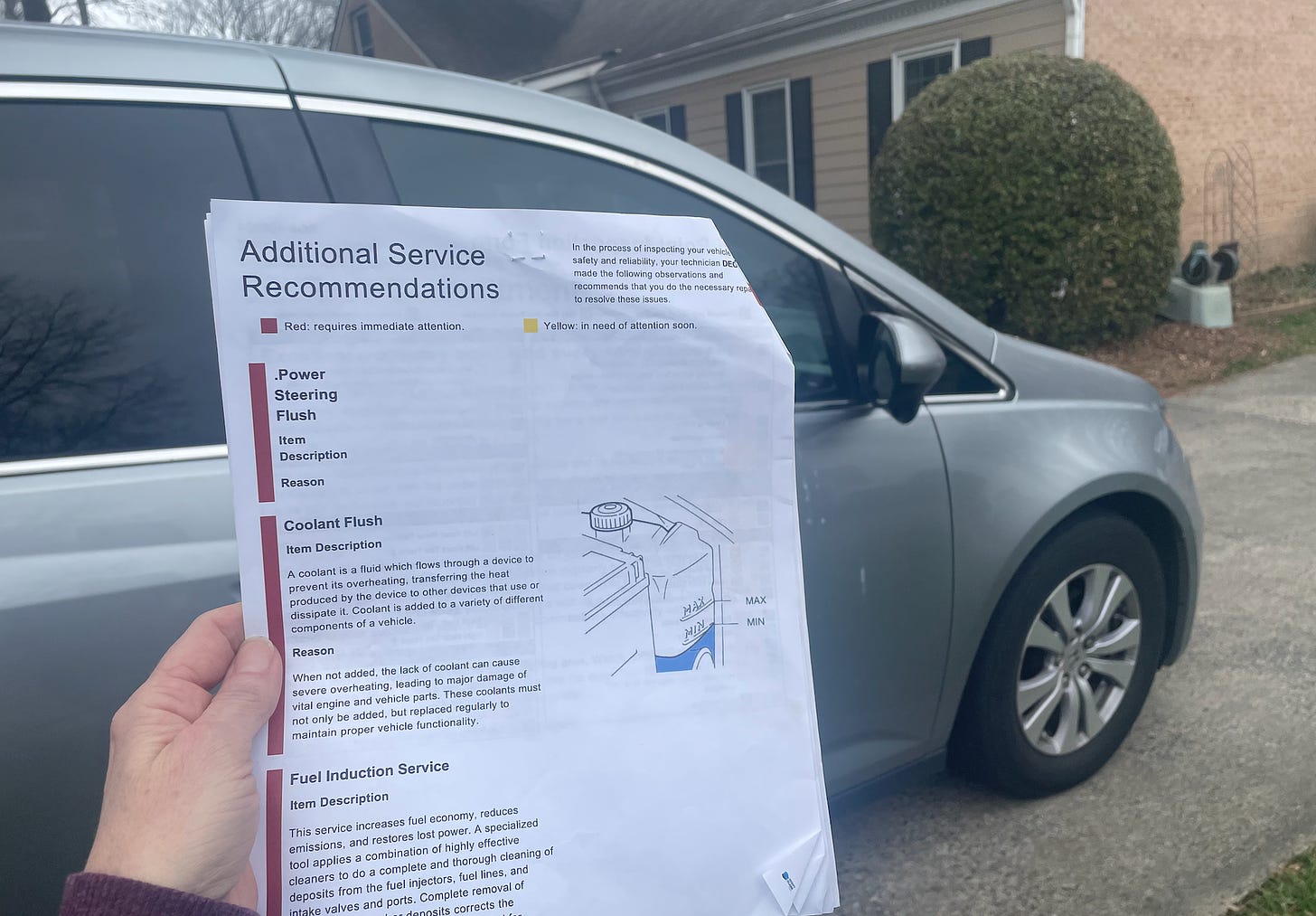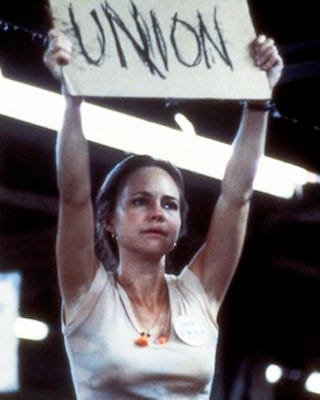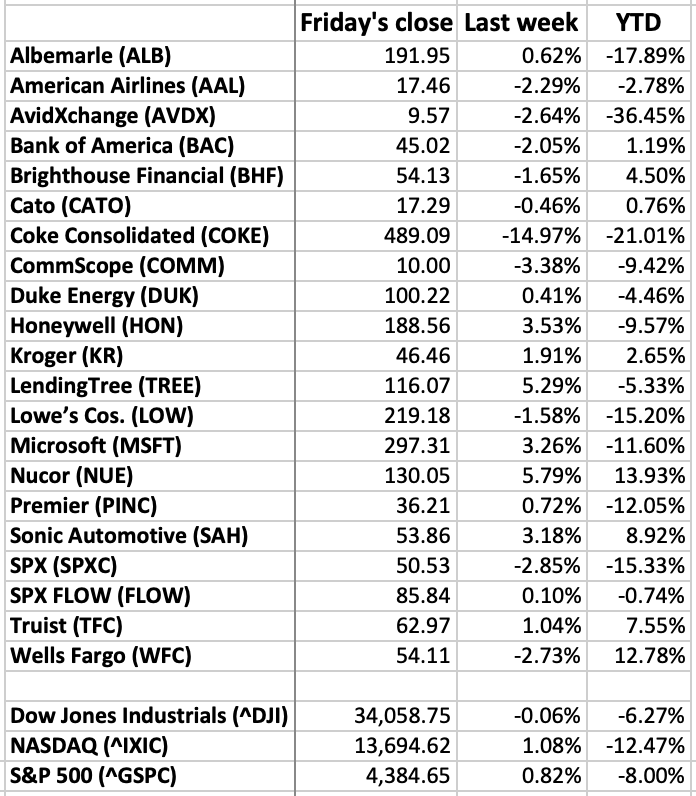A Charlotte Honda dealer suggested $800 in repairs. Were they needed?
Plus: Charlotte Observer employees push for a union; New chicken restaurant franchise sees growing market; Atrium CEO pay rises to nearly $10M; Ledger panel on travel advice
Good morning! Today is Monday, February 28, 2022. You’re reading The Charlotte Ledger, an e-newsletter with local business-y news and insights for Charlotte, N.C.
Need to subscribe — or upgrade your Ledger e-newsletter subscription? Details here.
Today's Charlotte Ledger is sponsored by By George Communications, which helps people, companies and organizations raise their visibility and credibility through storytelling and PR.
I took my minivan in for an oil change. The dealer recommended 3 pricey services Honda says are rarely necessary.
➡️ Plus: Tips to be prepared the next time you visit a mechanic
By Michelle Crouch
I took my 2016 Honda Odyssey to the service department at Scott Clark Honda recently for a simple oil change.
After 30 minutes, my service advisor approached with unexpected news: An inspection revealed my five-year-old minivan, which had 59,000 miles, needed additional work, he said. A printout outlined three recommended services: a power steering flush, a coolant flush and a fuel induction service. The services were coded in red, an indicator that each “Requires immediate attention.”
The additional work would boost my charges from just $40 for an oil change to $511. The advisor also recommended a $297 brake job, but he said that could wait for my next appointment.
“Wow, that’s a lot of money,” I said. “Do I really need to do all of this now?”
The advisor assured me that yes, I needed all three services. Fortunately, I decided to hold off and do some research first.
What I learned should interest anyone who routinely takes their car to a dealership for service.
It turns out that American Honda — the manufacturer that built my car — does not recommend the services mentioned by the dealership, except in “rare instances.” In a position statement published by Honda, all three are included in a list of procedures it “does not recommend or generally considers unnecessary.”
The statement was published in 2019, but American Honda spokesman Carl Pulley says it’s still accurate.
Pulley says Honda recommends following the maintenance schedule in your owner’s manual, or the one programmed into your Honda’s “maintenance minder,” a light-up display that uses letter and number codes to tell you when to do specific services. (Note: my maintenance minder had called only for an oil change.) In his email response, Pulley attached a typical Honda service schedule and noted that the three services I referenced are not included.
When I told Pulley about my experience at Scott Clark Honda, he noted that “Honda dealerships are franchised independently owned and operated businesses.”
Scott Clark Honda’s response: The service manager at Scott Clark Honda did not return a phone call and referred The Ledger to LaToya Evans at The LEPR Agency, a public relations firm. When asked why a service advisor at Scott Clark recommended three services that American Honda says are unnecessary, Evans emailed The Ledger a statement. It said:
At Scott Clark Honda, we deliver world class service through our highly trained, experienced maintenance technicians and customer service representatives. As such, our team makes service recommendations based on a number of factors including vehicle age, known recalls, manufacturer notices on certain models, and the frequency of other services performed in a particular climate or area. With integrity, safety and reliability at the center of all we do, our team works to make the best recommendations for our customer’s individual vehicle needs. Service advisors are not paid on commission.
Referring to the Honda position statement referenced above, Evans wrote:
While the statement issued in 2019 addresses vehicles serviced outside of Honda, other recommendations may be made according to the Honda service guide. The recommendations in this matter were based on known issues with that particular model given high mileage. While these suggestions are in no way mandatory, our goal at Scott Clark Honda is to ensure we make the appropriate recommendations to have every customer’s vehicle run safely and at peak performance.
Evans also provided eight service bulletins about known problems with specific Honda models, but only one applied to the 2016 Odyssey, my vehicle. That service bulletin says a “judder” (rapid forceful shaking) could occur in my model even after a software update, and if that happens, the technician should flush the transmission. Since a transmission flush was not one of the three services recommended to me — and I had never experienced any shaking of my van — it does not seem to apply to my case.
After receiving Evans’ response, The Ledger went back to Pulley, the American Honda spokesman, and asked if the 2019 position statement addresses vehicles serviced outside of Honda, at Honda dealerships or both. He said it relates to the “maintenance of Honda vehicles.”
Upselling by dealerships is common: Dealer service departments recommend costly and unnecessary service items “all the time,” says Ronald Montoya, senior consumer advice editor at Edmunds.com, an automotive research site. Service advisors are encouraged to look for ways to bring in extra revenue, he says.
“One thing people don’t realize is there is a difference between a dealer recommendation and a manufacturer recommendation,” Montoya says. “The people who made the car know best. They built the car. What the dealer recommends is to make them money. It’s an opportunity for them to make a bit of extra profit on each sale.”
Montoya, who previously worked as a cashier in a dealership service department, says upsells can include replacing fluids and filters before it’s necessary, shorter intervals between service appointments and additives or fluid “flushes” that have no benefit.
Window stickers that remind you to come back for an oil change after three months or 3,000 miles are a classic upsell because most automakers today call for oil changes at 7,500, 10,000 or even 15,000 miles, Montoya says.
Other car repair shop tactics: The auto group AAA also warns drivers about unnecessary maintenance. On its site, it lists some of the most common unnecessary maintenance items, along with specific information to help you be more knowledgeable.
For example, it notes that dirt and debris on the surface of an air filter doesn’t necessarily mean it needs to be replaced, that most modern spark plugs are designed to last for at least 100,000 miles, and that a fuel induction service is not needed unless your vehicle has drivability problems.
Another tactic that car repair shops sometimes use is to try to get you to follow the maintenance schedule for a car driving under “severe conditions,” which recommends more frequent service, Montoya says.
“The dealerships tend to say if you sit in traffic, that’s a severe condition, but I disagree,” Montoya says. Instead, he says that schedule is meant for cars that primarily make trips under five miles (like delivery or Uber drivers), that mostly drive in extremely hot, extremely cold or dusty conditions, or cars that routinely tow a trailer.
Customers may get different answers than media: Unfortunately, customers who aren’t journalists may not get similar help from American Honda when trying to sort out which repairs are really required. When I emailed Honda customer relations (as opposed to reaching out as a reporter) to ask about the services Scott Clark Honda recommended for my car, they repeatedly told me I should trust the service department at my local dealership.
“I would go with whatever the dealership says,” agent Kiona Jackson told me in a phone call. “The technicians at Honda dealerships are authorized and trained for Honda vehicles. If they recommended those things, I’m sure they diagnosed the vehicle and saw a potential issue.”
Be a smarter customer: That means it’s up to drivers to ensure they aren’t paying for unnecessary repairs, Montoya says.
“This is not to discourage anyone from going to a dealership,” Montoya says, noting that some independent repair shops also push unnecessary repairs. “I actually prefer the level of service and knowledge they have. It’s just a reminder to us as customers to be informed and do your research about what is needed before you go in.”
His best advice? Open your owner’s manual and be familiar with what it recommends at each mileage mark before you bring in your car. If you have a maintenance minder, know what the letters and numbers mean. “Be very specific about what you want,” he says.
Then, if your service advisor comes to you recommending additional services after your car has been inspected, ask for an explanation of the extra work and why the technician believes it needs to be done.
Keeping good records about repairs and services can help in those situations, Montoya says. “You should know roughly know how long it’s been since you’ve done a service,” he says. “If they’re recommending new brake rotors and it’s only been a year, I probably wouldn’t replace them. If it’s been three or four years, it’s something to consider.”
Consider a second opinion. If, like me, you don’t know a rotor from a radiator, you can always take your car to a different repair shop for a second opinion, especially if the recommended service item is going to bust your budget.
That’s what I did. After leaving Scott Clark Honda, I took my Odyssey to an independent repair shop. Without mentioning my recent visit to the dealership, I asked the technicians there to give the car a once-over and let me know what it needed.
The technicians said the car looked good, asked questions about what maintenance items had already been performed and did not recommend any additional repairs or services.
When I asked specifically about the coolant flush, power steering flush and fuel induction service the dealer had recommended, they had a quick response: “Honda as a company does not recommend those services,” they said.
Michelle Crouch is a freelance writer and a regular contributor to The Ledger. Send her story tips at michellecrouchwriter@gmail.com.
Today’s supporting sponsors are T.R. Lawing Realty…
… and Whitehead Manor Conference Center, a peaceful, private, and stress-free space for your organization’s next off-site meeting or event. Conveniently located in South Charlotte, Whitehead Manor is locally owned and operated and provides modern meeting capabilities with attention to stellar service!
Unionization effort at The Charlotte Observer doesn’t look like much of a fight
All signs seem to be pointing toward a successful drive to unionize The Charlotte Observer, with a group of the paper’s journalists saying that 80% of the non-management staff are on board with the effort.
In a news release and social media posts on Friday, Observer reporters said they had formed the Charlotte Observer News Guild — which is affiliated with the Washington-Baltimore Newspaper Guild, part of the 700,000-member Communications Workers of America. And in an interview with The Ledger, one of the leaders of the group, investigative reporter Sara Coello, said 80% of the paper’s 35-or-so workers had signed documents supporting the effort. Lawyers filed papers Friday with the National Labor Relations Board.
That leaves the newspaper and its owner, McClatchy Co., with a choice: either hold an election supervised by the NLRB, or agree voluntarily to recognize the union. The strong level of support among The Observer’s workers suggests that management would lose an election, and McClatchy has opted to recognize unions at other newspapers recently instead of opting for a vote, including papers in Columbia, Hilton Head and Beaufort, S.C. McClatchy was bought out of bankruptcy by hedge fund Chatham Asset Management in 2020.
Asked by The Ledger to comment on how The Observer would proceed, executive editor Rana Cash said by email: “No thanks.”
Coello said the new group first informed Cash of its unionization efforts on Friday morning, in an email from a lawyer. She said Observer workers are not reacting to any particular slight or incident, but that they want to ensure they have “a voice and a seat at the table” in charting the newspaper’s future and to make sure that it is a good place to work.
“We care a lot about Charlotte and about this paper,” said Coello, 26, who joined The Observer last year. The movement seems to be driven by some of the paper’s younger reporters, many of whom on Friday changed their social media profile pictures to a newly designed union logo. Their news release quoted business reporter Hannah Smoot, marginalized communities reporter Devna Bose, affordable housing reporter Lauren Lindstrom and senior audience growth and engagement producer Kristen Kornbluth — all of whom have joined the paper since 2019. It also quoted longtime sports columnist Langston Wertz Jr.
‘Right-to-work’: North Carolina is one of 27 “right-to-work” states, in which workers cannot be compelled to join unions and pay union dues, even if they receive the benefits of union negotiations. N.C. law also forbids public-sector unions. Firefighters, police and teachers have membership associations that advocate for better working conditions and call themselves unions, though they are barred from negotiating with local governments.
North Carolina has the second-lowest level of union membership in the country, at 3.4%, according to the Bureau of Labor Statistics. South Carolina has the lowest (2%). Employees at only two other Charlotte companies have filed papers with federal officials seeking representation in the last year, according to NLRB data.
While unions have had strong roots in the manufacturing sector — think of the Sally Field movie “Norma Rae,” about organizing a North Carolina textile mill — they have started moving lately into more white-collar jobs. One union has recently started organizing Starbucks stores, winning elections in New York and Arizona.
Employers often don’t like unions because union contracts can drive up costs and limit flexibility. Backers say they give employees added protections. —TM
New restaurant franchise sees future in crowded chicken market
There is plenty of competition in chicken restaurants these days, but a local company says there’s room for more.
Break Bread Ventures is opening its first Slim Chickens restaurant on Tuesday near Mallard Creek High School, the first of what it says will be about 30 restaurants in the Carolinas, including 15 or so in the Charlotte region. There are others in the works in Indian Trail and Concord.
Break Bread partner Rob Bryan tells The Ledger that while there are plenty of chicken restaurants, there aren’t that many in the “better chicken category” available from counter service, and that demand for chicken is still rising.
“People are still looking to transition to chicken,” he says. “It still keeps going up as a segment. … You know when you taste a good, fresh tender, it’s not so heavily breaded. You taste it, and it tastes more like something you might make at home for yourself.”
The restaurants will have wings, tenders, fried okra, fried pickles, sandwiches, salads and mason jars filled with cheesecake — which should “fit some of the dad, mom and kid categories,” Bryan says.
Hey, if it can cut down on traffic backups near Charlotte Chick-Fil-A’s, we’re all for it. —TM
Mark your calendar for next Ledger Live online event: ‘Set to jet? – What to know about the new world of travel’
On Thursday, March 10, at 7 p.m., we’re holding an online event exclusively for Ledger members. It’s focused on getting you up to speed on planning and taking vacations in case you, like us, have a hankering for packing a suitcase again and heading out for an adventure.
We’re holding the event in partnership with our friends at Jumbo, a Charlotte company that builds live-streaming platforms.
We’ll open up registration soon, and will publish a registration link in the newsletter in the coming days.
Our panelists are:
Karen Shelton, owner of My Path Unwinding Travel and Luxury Travel PhD
Roni Fishkin of Mann Travels
Lora Schapiro of Tauck
We’ll cover topics including best-bets for destinations, what’s happening in the world of cruises, navigating Covid restrictions, how to handle travel insurance, what changes you’ll find when you get back out there, and more. (Do you have a question or topic you’d like to see our panel address? Let us know.)
The Ledger’s Cristina Bolling will moderate. Stay tuned for registration info, and mark the evening of Thursday, March 10, on your calendar. We hope to see you there! —CB
(Not a Ledger member but want to attend? Join us as a paying Ledger member today so you don’t miss out!)
In brief:
Atrium CEO pay rises: Atrium Health CEO Gene Woods earned $9.8M in total compensation in 2021, according to a report the health system released Friday. That’s 24% more than the previous year. Atrium listed 10 other executives who made more than $1M apiece. The healthcare system said it enlisted outside advisers to consult on executive pay. It is also raising its minimum pay for all workers to $16 an hour. (Biz Journal, subscriber-only)
In memoriam: Former City Council member Claire Fallon passed away on Sunday, her family wrote on Facebook. She served on the council from 2011-2017. (WCCB)
Samaritan’s Purse ships out near Ukraine: Disaster response specialists from North Carolina-based Samaritan’s Purse will be headed to Poland and Romania to help refugees in the wake of the conflict in Ukraine. CEO Franklin Graham said the organization can help feed people and provide clothing and can operate a mobile field hospital if needed. (WBTV)
Republicans tangle at first Senate debate: Former Gov. Pat McCrory and two challengers faced off in the first GOP Senate debate on Saturday, generally agreeing that they would oppose President Biden’s new Supreme Court nominee and denouncing Russia’s invasion of Ukraine. They also objected to the government’s response to Covid. One of the leading candidates, Rep. Ted Budd, did not participate. (WRAL)
Downgraded to ‘medium’ Covid transmission: The Centers for Disease Control and Prevention reclassified how it assesses the level of Covid transmission, and it now considers Mecklenburg to have “medium” Covid spread. The new formula incorporates hospital admissions data. Union, Cabarrus and Iredell are also “medium,” while Lincoln and Gaston are “high.” For communities at the “medium” level, the CDC recommends people at risk for severe illness to “talk to your healthcare provider about whether you need to wear a mask and take other precautions,” and it does not include a recommendation to wear masks indoors.
Taking stock
Unless you are a day trader, checking your stocks daily is unhealthy. So how about weekly? How local stocks of note fared last week (through Friday’s close), and year to date:
Need to sign up for this e-newsletter? We offer a free version, as well as paid memberships for full access to all 4 of our local newsletters:
➡️ Opt in or out of different newsletters on your “My Account” page.
➡️ Learn more about The Charlotte Ledger
The Charlotte Ledger is a locally owned media company that delivers smart and essential news through e-newsletters and on a website. We strive for fairness and accuracy and will correct all known errors. The content reflects the independent editorial judgment of The Charlotte Ledger. Any advertising, paid marketing, or sponsored content will be clearly labeled.
Like what we are doing? Feel free to forward this along and to tell a friend.
Social media: On Facebook, Instagram, Twitter and LinkedIn.
Sponsorship information: email brie@cltledger.com.
Executive editor: Tony Mecia; Managing editor: Cristina Bolling; Contributing editor: Tim Whitmire, CXN Advisory; Contributing photographer/videographer: Kevin Young, The 5 and 2 Project










